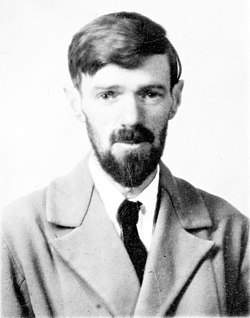D.H. Lawrence Quote
Connie went for walks in the park, and in the woods that joined the park, and enjoyed the solitude and the mystery, kicked the brown leaves of autumn, and picked the primroses of spring. But it was all a dream; or rather it was like the simulacrum of reality. The oak leaves were to her like oak-leaves seen ruffling in a mirror, she herself was a figure somebody had read about, picking primroses that were only shadows or memories, or words. No substance to her or anything...no touch, no contact!
D.H. Lawrence
Connie went for walks in the park, and in the woods that joined the park, and enjoyed the solitude and the mystery, kicked the brown leaves of autumn, and picked the primroses of spring. But it was all a dream; or rather it was like the simulacrum of reality. The oak leaves were to her like oak-leaves seen ruffling in a mirror, she herself was a figure somebody had read about, picking primroses that were only shadows or memories, or words. No substance to her or anything...no touch, no contact!
Related Quotes
The downfall of the attempts of governments and leaders to unite mankind is found in this- in the wrong message that we should see everyone as the same. This is the root of the failure of harmony. Bec...
C. JoyBell C.
Tags:
color, culture, difference, differences, equality, government, harmony, human, humanism, humanity
About D.H. Lawrence
David Herbert Lawrence (11 September 1885 – 2 March 1930) was an English novelist, short story writer, poet, playwright, literary critic, travel writer, essayist, and painter. His modernist works reflect on modernity, social alienation and industrialization, while championing sexuality, vitality and instinct. Four of his most famous novels – Sons and Lovers
(1913), The Rainbow (1915), Women in Love (1920), and Lady Chatterley's Lover (1928) – were the subject of censorship trials for their radical portrayals of romance, sexuality and use of explicit language.
Lawrence's opinions and artistic preferences earned him a controversial reputation; he endured contemporary persecution and public misrepresentation of his creative work throughout his life, much of which he spent in a voluntary exile that he described as a "savage enough pilgrimage". At the time of his death, he had been variously scorned as tasteless, avant-garde, and a pornographer who had only garnered success for erotica; however, the English novelist and critic E. M. Forster, in an obituary notice, challenged this widely held view, describing him as "the greatest imaginative novelist of our generation". Later, the English literary critic F. R. Leavis also championed both his artistic integrity and his moral seriousness.
(1913), The Rainbow (1915), Women in Love (1920), and Lady Chatterley's Lover (1928) – were the subject of censorship trials for their radical portrayals of romance, sexuality and use of explicit language.
Lawrence's opinions and artistic preferences earned him a controversial reputation; he endured contemporary persecution and public misrepresentation of his creative work throughout his life, much of which he spent in a voluntary exile that he described as a "savage enough pilgrimage". At the time of his death, he had been variously scorned as tasteless, avant-garde, and a pornographer who had only garnered success for erotica; however, the English novelist and critic E. M. Forster, in an obituary notice, challenged this widely held view, describing him as "the greatest imaginative novelist of our generation". Later, the English literary critic F. R. Leavis also championed both his artistic integrity and his moral seriousness.
